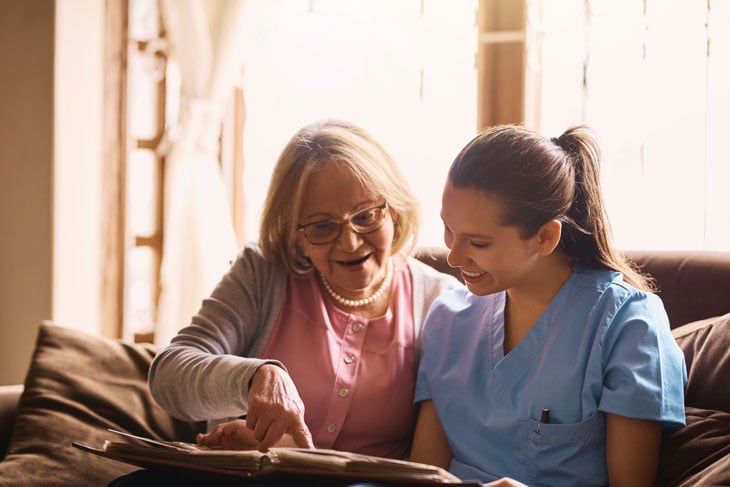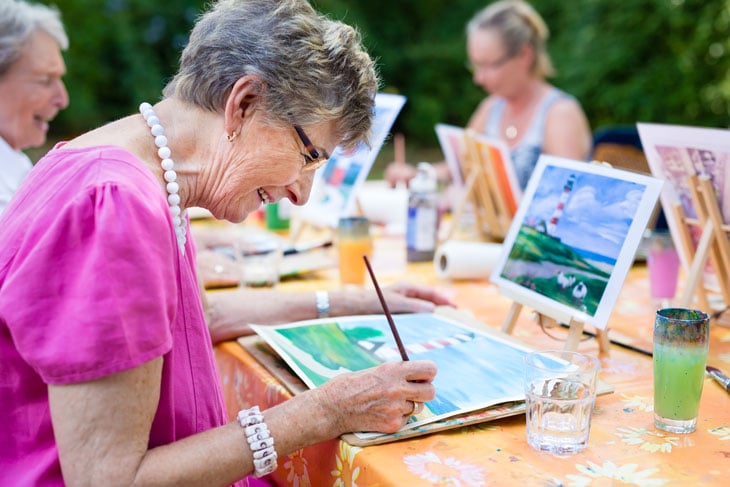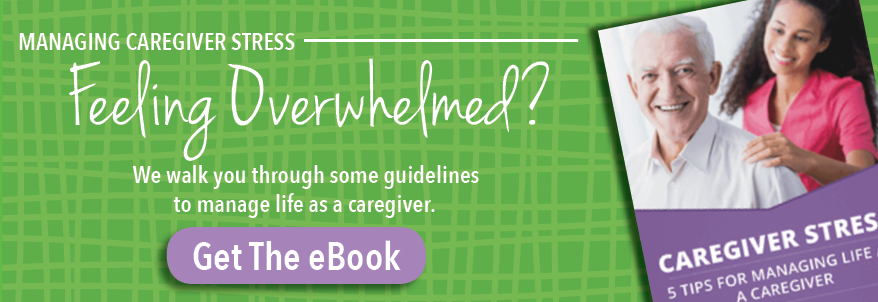
5 Things You Should Know About Personal Care
Personal care homes provide seniors with professional assistance when needed and a way to enjoy an active lifestyle. Most personal care and assisted living communities offer meals, housekeeping and transportation services, assistance with the activities of daily living (ADL's), security and 24/7 on-call assistance. Personal care homes provide the opportunity for companionship for those seniors who would benefit from daily support and often host programming in a group setting to promote socialization. Many communities have been successful in adapting activities and engagement to adhere to social distancing guidelines.
1. Personal care can help increase social engagement
A 2017 Profile of Older Americans by the Federal Administration for Community Living states “Many seniors live to healthy old ages but one in five will need personal care after they reach age 85. Only about 14% of all older adults live alone, but nearly half of women over 75 live by themselves”.
Some older adults who have lived in their home most of their lives resist the idea of moving and view moving to senior living as an ‘ending’ while the opposite can be true. Personal care homes can offer people the opportunity to thrive because the burdens associated with managing ADLs by themselves is removed, allowing the individual to focus on their interests and pursuit of new hobbies and friendships. Being socially engaged can reduce the risk for mental health issues, improve physical health and create a sense of belonging. Socially engaged seniors are often more motivated to maintain their health than their isolated peers. If you are researching personal care homes, look for those with robust social programs that foster continued engagement.
2. Nutritious, well-balanced meals are required in Personal Care
Eating a well-balanced diet is an important part of staying healthy as you age. It can help you maintain a healthy weight, stay energized, and get the nutrients you need. Proper nutrition also lowers your risk of developing chronic health conditions, such as heart disease, diabetes and osteoporosis. According to the National Resource Center on Nutrition, Physical Activity, and Aging “1 in 4 older Americans have poor nutrition”. Malnutrition puts you at risk of becoming overweight or underweight. It can weaken your muscles and bones and leave you vulnerable to disease.
Your doctor may recommend changes to your diet to help prevent serious health conditions. For example, if you are at risk for diabetes, high blood pressure or cholesterol, you should eat food rich in nutrients and low in excess calories, processed sugar, saturated fats, trans fats and sodium. Older adults living alone can often find these diet restrictions overwhelming when coupled with poor mobility and isolation. By regulation, Personal care homes are required to offer three nutritious, well-balanced meals that meet the recommended dietary allowances established by the United States Department of Agriculture. Any special dietary needs prescribed by a physician must also be met. In addition, many personal care homes hold special events featuring food like ice cream socials, strawberry festivals and Victorian teas. During the height of the COVID-19 pandemic, these special treats were delivered to residents in their rooms.
3. Short Stays are offered in Personal Care
Being a caregiver for an older adult can be rewarding, but also frustrating and time-consuming which can lead to caregiver burnout. Caregiver burnout is a state of physical, mental and emotional exhaustion that may cause a change in attitude. Instead of positive and caring, caregivers can become negative and unconcerned. Caregivers may feel fatigue, stress, or guilt when they spend time on themselves rather than their loved one.
Caregivers who need a break can research respite care options in personal care. Many personal care homes offer stays as short as 5-7 days that can be reserved in advance. While a much needed break is provided to the caregiver, your loved one can relax in their private space, enjoy delicious meals and engage in conversations and activities with their peers. The increased availability of the COVID-19 vaccines in personal care communities has significantly reduced the spread of COVID-19 throughout communities. Rigorous infection protocol practices are also enforced daily at all PSL communities. You can feel confident your loved one can enjoy a safe environment for their respite stay at any PSL community.
4. There are ways to offset the cost of Personal Care
The Pennsylvania statewide average monthly cost of personal care in 2018 was $3,670. Medicare and employer-based health coverage will not pay for personal care services. Some individuals may have long term care insurance that can help with the expense of personal care. These policies offer many different coverage options including personal care, adult day services, home care and skilled nursing. If you need assistance with care and are concerned with associated costs, read over your policy or contact your insurance company for assistance.
The Veterans administration pension with Aide & Attendance for Veterans and surviving spouses provides financial assistance for those who qualify and require assistance with daily living activities on a long term basis. This includes personal care, skilled nursing, adult day care and home care. Financial assistance for those qualified can range from $1,200-2,800 each month. If you are caring for a Veteran, it’s well worth looking into if he or she qualifies for VA benefits. Veterans have to formally enroll with the VA by calling the VA toll-free at 877-222-8387 or visit their website to apply.
5. Memory Care is an option in Personal Care
Memory care is a distinct form of long-term care designed to meet the specific needs of a person with Alzheimer’s disease, dementia or other types of cognitive impairment. If you are considering memory care for your loved one, understand that many personal care and assisted living communities offer a special memory care unit on a separate wing or floor. Staff members have received special training to assist people with dementia or impaired cognition.
Typical services include 24-hour supervised care, medical monitoring and assistance with daily living tasks, in addition to a pleasing environment that is easy for residents to navigate. The Easton Home personal care memory support neighborhood in Easton, PA offers reminiscence therapy which encourages engagement by prompting people to remember their earlier lives and creating an environment to support them. Before you choose a memory care option, you may want to compile a list of questions that cover your concerns about your loved one’s care, comfort and safety.
Being a full-time caregiver can be overwhelming. At Presbyterian Senior Living, we are here to help you and provide you with every resource possible to position you for success and help prevent the all too common caregiver burnout. Download our eBook today to learn ways to help combat the stress of caregiving.
About Presbyterian Senior Living
As the trusted leader in aging services, Presbyterian Senior Living combines over 95 years of experience with innovative approaches to senior communities and services. Across our 27 communities in PA, MD, OH, and DE, we serve over 6,500 seniors. We are committed to: FOSTERING teamwork and responsibility. UPHOLDING integrity in every action. EMBRACING innovation to create opportunities for everyone’s success. LEADING with compassion and respect.






